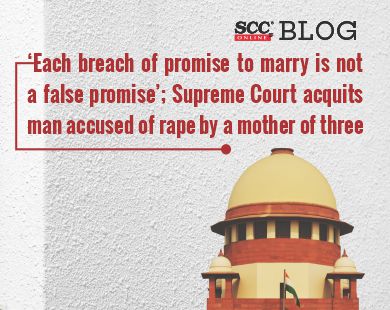Supreme Court: The bench of Ajay Rastogi and Bela M. Trivedi*, JJ has acquitted a man of rape charges in a case where a married woman, having three children, got into an extra-marital relationship with him and later accused him of rape when he did not marry her.
Undisputed facts
(i) Prosecutrix was a married woman having three children.
(ii) Accused was staying in a tenanted premises situated in front of the house of the prosecutrix.
(iii) Though initially hesitant, the prosecutrix developed liking for the accused, and both started having sexual relationship with each other.
(iv) The prosecutrix delivered a male child in October 2011. The accused is the father of this child.
(v) The prosecutrix went to the native place of the accused in 2012 and came to know that he was a married man having children.
(vi) The prosecutrix still continued to live with the accused in separate premises.
(vii) The prosecutrix and her husband took divorce by mutual consent in 2014 and thereafter prosecutrix permanently left her three children with her husband.
(viii) The prosecutrix lodged the complaint on 21st March, 2015 alleging that she had consented for sexual relationship with the accused as the accused had promised her to marry and subsequently did not marry.
Supreme Court’s Ruling
The entire case of the prosecutrix was based on the premise that she had given her consent for sexual relationship under the misconception of fact, as the accused had given a false promise to marry her and subsequently he did not marry, and therefore such consent was no consent in the eye of law and the case fell under the Clause – Secondly of Section 375 IPC.
The Sessions Court, as well as the Delhi High Court, held the accused guilty of the offence under Section 376 IPC.
The Supreme Court found fallacy on the part of the courts below to hold the appellant guilty under Section 376 IPC and explained the difference between giving a false promise and committing breach of promise by the accused.
“In case of false promise, the accused right from the beginning would not have any intention to marry the prosecutrix and would have cheated or deceited the prosecutrix by giving a false promise to marry her only with a view to satisfy his lust, whereas in case of breach of promise, one cannot deny a possibility that the accused might have given a promise with all seriousness to marry her, and subsequently might have encountered certain circumstances unforeseen by him or the circumstances beyond his control, which prevented him to fulfill his promise.”
Hence, it was held that it would be a folly to treat each breach of promise to marry as a false promise and to prosecute a person for the offence under Section 376. Each case would depend upon its proved facts before the court.
Coming to the facts of the case, the Court noticed that the prosecutrix who herself was a married woman having three children, could not be said to have acted under the alleged false promise given by the appellant or under the misconception of fact while giving the consent to have sexual relationship with the appellant.
The Court said that even if the allegations made by her in her deposition before the court, are taken on their face value, then also to construe such allegations as ‘rape’ by the appellant, would be stretching the case too far as the prosecutrix being a married woman and the mother of three children was matured and intelligent enough to understand the significance and the consequences of the moral or immoral quality of act she was consenting to.
The Court went on to make some key observations on the conduct of the prosecutrix and said that she had betrayed her husband and three children by having relationship with the accused. She had no grievance when she decided to start living with the accused during the subsistence of her marriage with her husband. Nor did she complain when she was impregnated by the accused. She also continued to live with him even after finding out that he was a married man having children. She even obtained divorce from her husband by mutual consent in 2014, leaving her three children with her husband.
It was only in the year 2015 when some disputes must have taken place between them, that she filed the present complaint. It is important to note that the accused in his further statement recorded under Section 313 of CrPC had stated that the prosecutrix had filed the complaint as he refused to fulfil her demand to pay her huge amount.
The Court was, hence, of the view that having regard to the facts and circumstances of the case, it could not be said by any stretch of imagination that the prosecutrix had given her consent for the sexual relationship with the appellant under the misconception of fact, so as to hold the accused guilty of having committed rape within the meaning of Section 375 of IPC.
While the Supreme Court has acquitted the accused from the rape charges levelled against him, it has made clear that the direction for payment of compensation given by the courts below shall remain unchanged as he had accepted the responsibility of the child, and has also paid the amount of compensation to the prosecutrix.
[Naim Ahamad v. State, 2023 SCC OnLine SC 89, decided on 30.01.2023]
*Judgment authored by: Justice Bela M Trivedi.
Advocates who appeared in this case :
For State: Advocate K.L Janjan;







